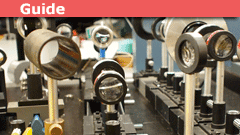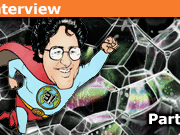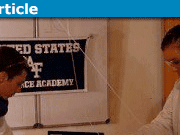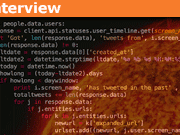How to Initiate Research Work As a Physics Major
Full Chapter List - So You Want To Be A Physicist... Series
Part I: Early Physics Education in High schools
Part II: Surviving the First Year of College
Part III: Mathematical Preparations
Part IV: The Life of a Physics Major
Part V: Applying for Graduate School
Part VI: What to Expect from Graduate School Before You Get There
Part VII: The US Graduate School System
Part VIII: Alternative Careers for a Physics Grad
Part VIIIa: Entering Physics Graduate School From Another Major
Part IX: First years of Graduate School from Being a TA to the Graduate Exams
Part X: Choosing a Research area and an advisor
Part XI: Initiating Research Work
Part XII: Research work and The Lab Book
Part XIII: Publishing in a Physics Journal
Part XIV: Oral Presentations
Part XIII: Publishing in a Physics Journal (Addendum)
Part XIV: Oral Presentations – Addendum
Part XV – Writing Your Doctoral Thesis/Desertation
Part XVI – Your Thesis Defense
Part XVII – Getting a Job!
Part XVIII – Postdoctoral Position
Part XIX – Your Curriculum Vitae
It has been a while since the last installment of this series, so let’s recap on where you are right now. You should already made a choice on the physics subject area that you want to work in, and you have picked an advisor who will be (i) supervising your Ph.D. research work (ii) the chairperson of your thesis committee.
We will now be in the ”meat” of the whole thing. This is where most physics students entering college have wanted to be – doing research-front work in an area that one has picked, and hopefully, has an acute interest in. Since this is such an important and major part of your Ph.D. program, I will devote several chapters to this. I will also describe this from the point of view of someone who worked as an experimentalist, so some of the advice being given tend to be more applicable to experimentalists than to theorists. But in general, most of the generic events and steps tend to be quite similar.
The first thing you have to get rid of is the notion that doing research work is a” glamorous”, exciting, 30-thrills-a-minute type of work. Nothing could be further than that. A lot of time, you will be sitting on your rear end, waiting for something to either occur or finished. Sometimes it requires taking a graveyard shift, late at night. Often, you have to do physical labor work, crawling under things, doing repairs, etc. Or, you are sitting in front of a computer monitor at 3 AM trying to find the bug in your codes. I’m telling you all this now to make sure you do not go into this with the wrong set of misconceptions. While doing research work CAN be exciting and fascinating, most of the time, it can be downright boring. So be prepared for such things and adjust.
One of the things that one MUST do as soon as one selects an area of study is to figure out the STATE OF KNOWLEDGE of that field. You need to be aware of what is currently known, what is being actively studied, what is the ”hot news”, who are the BIG names, and who’s doing what to whom. What this means is that you may end up spending a considerable portion of your time doing nothing but reading tons and tons of papers and journals. Often, you start reading a paper and then discover that you need to look at the reference being cited in that paper. So you get that reference and it turns out you need another paper or two being cited there! It’s a chain of events that can sometimes be quite frustrating, but it is a necessary part of trying to be up to date on the state of knowledge in that field. I certainly know that when I started my Ph.D. research work, I spent on average 30% of my time during the first 3 months or so reading everything I could get my hands on about the field that I’ve chosen.
You need to know the state of knowledge of the field for a number of reasons:
(i) you do not want to replicate what has already been done (unless you think there’s something more to be done and that somebody missed something)
(ii) you need to know not only what’s interesting, but what is important.
(iii) you need to be aware of what area is the ”hot” topic, and who is working on this topic. Something that is hot tends to get funding.
Your advisor may have a specific project in mind for you to work on, or you and him/her have already agreed on what you will do, but you still need a broader perspective on what is going on in the field that you have selected. So even though you have decided that you want to study tunneling spectroscopy of superconductors for example, it doesn’t mean that you shouldn’t be paying attention to the progress in the field of superconductivity in general. You must start to be aware of the whole area of study that, more often than not, have a direct impact on your work.
So be prepared to do a lot of reading and catching up. Don’t be surprised if you end up spending up to half of your time doing nothing but reading journal papers. This is an effort you have to put in to prepare you for the next step in your research work.
PhD Physics
Accelerator physics, photocathodes, field-enhancement. tunneling spectroscopy, superconductivity








I really cannot disagree with anything said, but I would like to comment on one part in particular.
Zz said, “(ii) you need to know not only what’s interesting, but what is important.”
This is true, but it needs to be taken with a grain of salt, I think. If we pay too much attention to the consensus regarding what it important, then everyone would work on the same problem. Each researcher certainly needs to know why his work is important, but it does not always come from the fact that someone else says so. If we always waited for someone else to endorse out idea, we would never get there first. If a student sees clearly that a question is important, and can truly justify it even if it disagrees with consensus, then I think he should pursue that idea and find out. The worst that can happen is that he learns something nobody cares about, but that is hardly the end of the world. He may very well discover something that lots of people will care about when they find out.